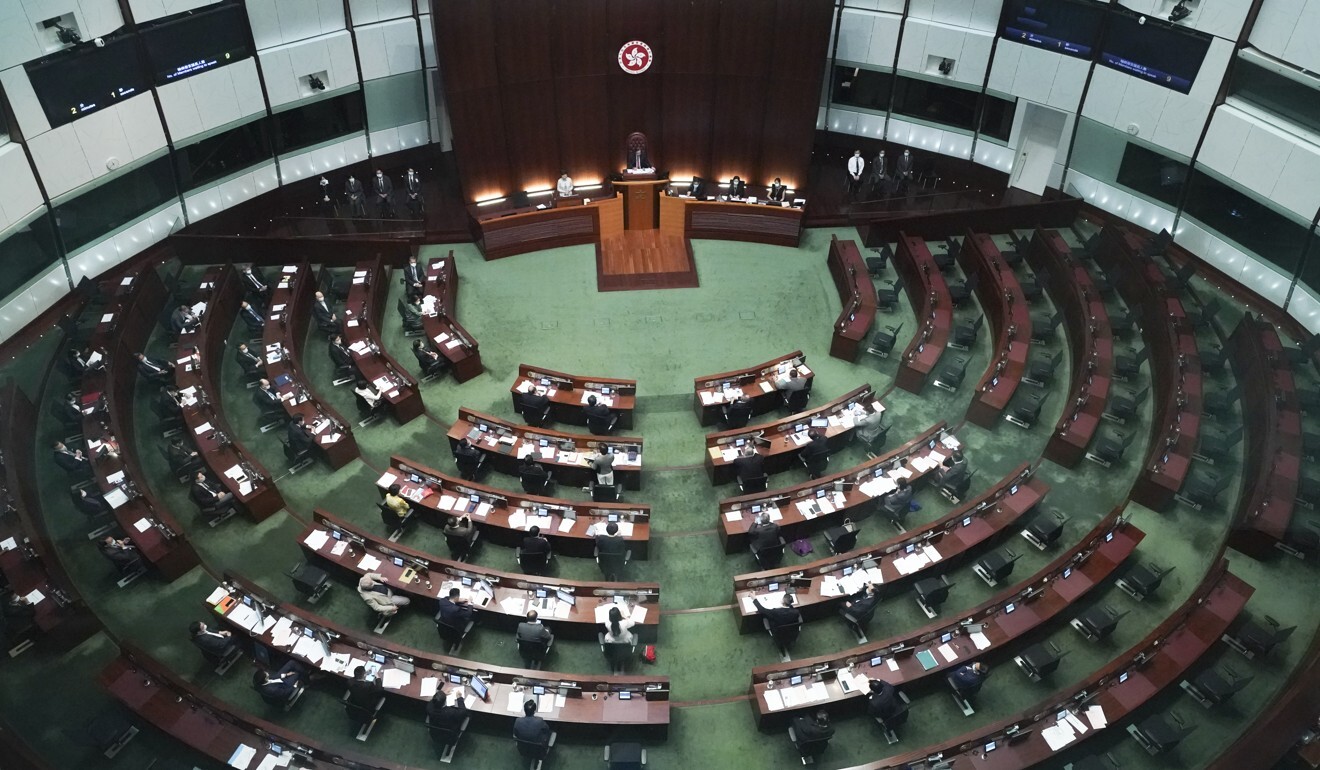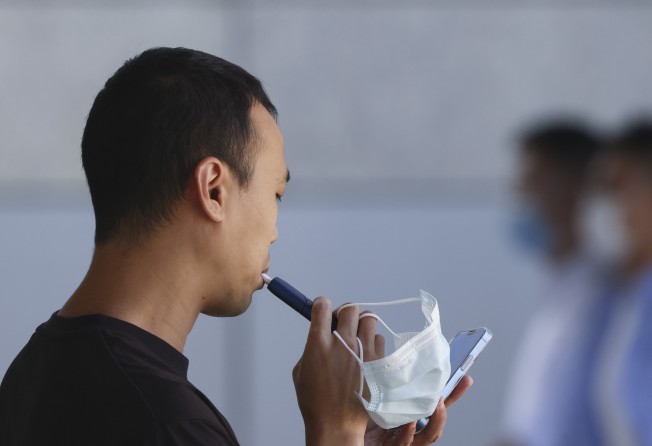
Hong Kong bans sale of e-cigarettes and other heated tobacco products but personal use still allowed
- Lawmakers pass bill banning import, sale and manufacture of electronic cigarettes and heated tobacco products
- But some legislators say bill goes too far in targeting the business of vaping and will hurt the import sector and deny a potential area for innovation

Lawmakers passed a long-delayed bill on Thursday banning the import and sale of electronic cigarettes and heated tobacco products in Hong Kong, delivering a major victory for health activists and educators who have blamed the devices for encouraging smoking among young people.
While the new law targets the local business of vaping, people will still be free to use the gadgets, prompting some politicians to call for more aggressive measures to curb tobacco use, including banning smoking in all public places except for designated areas. But others argued Hong Kong should allow reshipment of e-smoking products and warned the ban would hurt logistics companies.
Lawmakers approved the Smoking (Public Health) (Amendment) Bill 2019 by a vote of 32 to three in the Legislative Council, now run by the pro-establishment bloc, roughly six years after the idea was first floated in the chamber. Two lawmakers abstained.

The bill outlaws not just the import and sale of alternative smoking products, including herbal cigarettes, but also their manufacture. Current restrictions on tobacco advertising will be extended to the promotion of alternative smoking products. The law is due to come into effect in six months.
Legislators voted down an amendment to allow for the transit of alternative tobacco products and another to permit imports for the purpose of industry development.
Health minister Sophia Chan Siu-chee hailed the passage of the bill, saying: “The rise of alternative tobacco products poses a risk to public health and also a blow to the anti-smoking efforts over the years.”
Chan dismissed the argument the new generation of tobacco products were less harmful than traditional cigarettes and noted many survey findings touted as evidence were carried out by tobacco companies.
“There is no scientific evidence either that consuming alternative cigarettes can help smokers quit smoking,” she said.
A Coalition of Tobacco Affairs spokesman said it was extremely disappointed over the passage of the bill and called the government’s decision on the blanket ban on the products unscientific and irrational.
“They should be regulated instead of banned,” he said.
Speaking ahead of the vote, lawmaker Tony Tse Wai-chuen, who represents the architectural, surveying, planning and landscape sector, urged the government to do more to encourage people to quit smoking.
“Whether heated tobacco products are more or less harmful [than other products], it is still bad for smokers, residents and society,” Tse said. “The government should consider making it a criminal offence for the underage to smoke … designate certain smoking zones and ban smoking in all other public and outdoor places.”
E-cigarettes are battery-powered devices that heat a solution in a cartridge to deliver an aerosol that users inhale in a way similar to conventional cigarettes. E-cigarette use is also known as vaping. For heated products, the tobacco is warmed up by an electronic device, rather than combusted.
Legislators Paul Tse Wai-chun, Frankie Yick Chi-ming, and Peter Shiu Ka-fai voted against the bill, while tourism sector lawmaker Yiu Si-wing and unionist Poon Siu-ping both abstained.
Some lawmakers had suggested authorities only regulate heated tobacco products, arguing they caused less harm to users than traditional cigarettes and could help smokers quit. Three lawmakers from the pro-business Liberal Party had proposed amendments to the bill.
Party leader Felix Chung Kwok-pan argued for allowing the import of alternative tobacco products for product development purposes, while transport sector legislator Yick suggested permitting such products to be imported through trucks for the purpose of re-exporting.
Yick argued the government-proposed ban on imports was too draconian, saying: “It will deal a blow to the logistics sector of Hong Kong.”
Shiu, the Liberal Party’s wholesale and retail sector representative, proposed banning e-cigarettes and only regulating heated tobacco products. But Legco president Andrew Leung Kwan-yuen banned the amendment, saying it would defeat the fundamental aim of the bill and force the government to spend a significant amount on new regulations.
Shiu also accused the government of ignoring overseas studies that smoking heated tobacco was less harmful than the traditional version.
“A total ban on all alternative cigarettes would only force people to smoke traditional cigarettes,” he said.
The city first proposed a total ban on e-cigarettes in 2015 and the proposal was watered down in 2018 when the government planned to regulate the products in the same way as traditional cigarettes.
The move was heavily criticised by the medical and education sectors, prompting Chief Executive Carrie Lam Cheng Yuet-ngor to propose a full ban on e-cigarettes, heated tobacco products and herbal cigarettes in her policy address that year.
Lam warned that e-cigarettes, which had grown into an industry worth as much as HK$30 million (US$3.86 million), were being promoted as less harmful than regular tobacco and targeted young people.
The bill was submitted to Legco for scrutiny in 2019.
The Committee on Home-School Co-operation welcomed the passage of the bill, saying it showed the government’s and legislature’s determination in protecting public health.
The director of the Asian Consultancy on Tobacco Control had also earlier pushed for the bill, calling all forms of tobacco use harmful.
“These new products offer a new, trendy, exciting way of using tobacco and nicotine, accompanied by appalling advertising directed at children,” Dr Judith Mackay told the Post last month. “And now we hear the same argument being used for heated tobacco products. It is a tired and discredited industry argument.”
According to the World Health Organization, tobacco kills more than 8 million people each year. More than 7 million of these deaths are caused by direct tobacco use, while about 1.2 million are the result of non-smokers being exposed to second-hand smoke, according to WHO.
In Hong Kong, the percentage of daily cigarette smokers aged 15 and above was 10.2 per cent in 2019, or about 638,000 people. Health minister Chan pointed to progress the city was making in reducing the prevalence of smoking, noting the rate had dropped from 20 per cent in the 1980s to about 10 per cent currently. The government aims to further lower the proportion to 7.8 per cent by 2025.